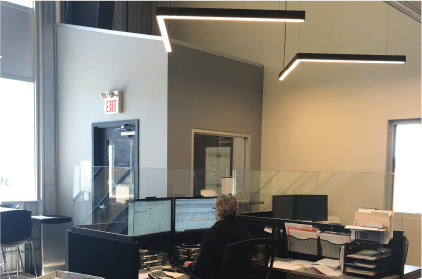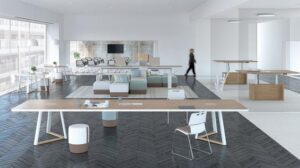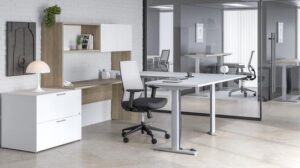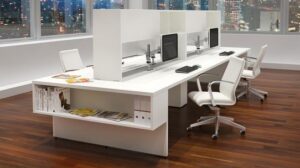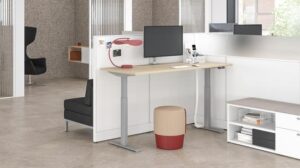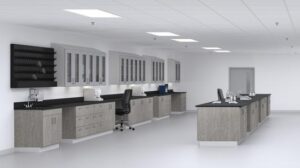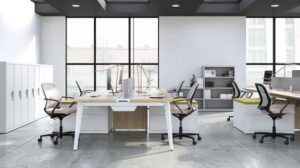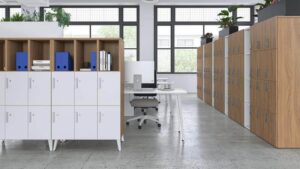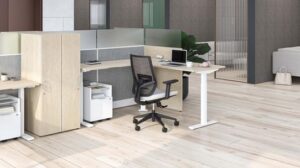If you have gone to any thriving office today, you’ll notice a remarkable shift: the workforce is more age-diverse than ever. Baby Boomers, with decades of experience and wisdom, are working alongside younger generations in dynamic, fast-paced environments. Traditionalists, too, continue to contribute invaluable institutional knowledge and a strong work ethic. Yet, the physical and mental demands of the modern workplace can be especially challenging for these seasoned team members. Here’s the big idea: the right office interior design, powered by modular furniture and ergonomic solutions, can dramatically reduce stress and empower both Baby Boomers and Traditionalists to thrive. Let’s explore how thoughtful corporate interior design and smart furniture choices are rewriting the rules for comfort, productivity, and well-being at work.
The Stress Challenge for Baby Boomers and Traditionalists
Workplace stress is universal, but for Baby Boomers, it’s often compounded by physical strain, mobility issues, and the pressure to keep up with evolving work styles. Traditional office setups, with rigid desks and static seating, can exacerbate discomfort and fatigue, leading to increased stress and even health problems. Traditionalists, who may prefer quieter and more structured environments, can also find the modern open-plan office overwhelming. The result? Reduced productivity, more sick days, and a loss of valuable expertise. But here’s the twist: modular furniture and adaptive office interior design can turn these challenges into opportunities for growth, comfort, and engagement.
Flexibility: The Heart of Modern Office Interior Design
The magic of modular furniture lies in its flexibility. Unlike the fixed, one-size-fits-all furniture of the past, modular pieces can be rearranged, expanded, or condensed to suit the needs of every employee, regardless of age or ability. In a well-designed corporate interior design plan, Baby Boomers can choose between open collaborative zones and private, quiet workspaces. Need more privacy? Movable partitions and modular desks make it easy to create a personal haven. Prefer a team setting? Slide the furniture into a collaborative cluster. This freedom of choice is essential for reducing stress, as it allows everyone to work in the environment that best suits their mood, task, and energy level. For Traditionalists, the ability to personalize their workspace and maintain familiar routines brings a sense of control and reduces anxiety.
Ergonomic Furniture: The Stress-Busting Game Changer
Let’s talk about the real heroes of office interior design: ergonomic furniture. For Baby Boomers, the advantages of ergonomic chairs and adjustable desks are profound. Ergonomic chairs with lumbar support, adjustable seat height, and armrests help maintain proper posture, reducing the risk of back pain and musculoskeletal issues that can sap energy and focus. Swivel bases and wheels make it easy to move around without straining, while padded seats and breathable materials ensure comfort during long hours at the desk.
Height-adjustable desks are another cornerstone of stress reduction in corporate interior design. These desks allow users to switch between sitting and standing, promoting better circulation and reducing fatigue. Research shows that Traditionalists who use sit-stand desks experience less back and neck pain, improved focus, and higher energy throughout the day. In a modular furniture system, these desks can be quickly customized for each user, even in hot-desking environments where employees share workstations.
Personal Comfort and Control
A key benefit of modular furniture is the ability for Baby Boomers to personalize their workspace. This isn’t just about comfort-it’s about dignity and independence. Employees can adjust their chairs, desks, and lighting to suit their unique needs, reducing both physical strain and mental fatigue. For Traditionalists with mobility challenges, accessible office layouts with wide walkways and easy-to-reach storage make the workspace safer and more manageable. When employees feel in control of their environment, stress levels drop and job satisfaction rises.
Reducing Noise and Distraction
Traditionalists often value quiet, focused work environments. Office interior design that incorporates acoustic panels, sound-absorbing materials, and modular partitions helps reduce noise and visual distractions. This attention to acoustic comfort supports mental well-being and allows seasoned team members to concentrate without being overwhelmed by the buzz of an open office. In a truly adaptive corporate interior design, everyone has the choice between lively collaboration and peaceful solitude. Baby Boomers, who may be juggling complex projects or leadership roles, benefit from spaces that allow them to focus deeply when needed.
Building Community and Connection
Stress isn’t just physical-it’s emotional, too. Thoughtful office interior design and corporate interior design create communal spaces that foster connection and belonging for employees of all ages. Modular lounge chairs, collaborative tables, and occasional tables encourage informal conversations, mentoring, and teamwork. When Baby Boomers feel valued and included, their stress decreases and their engagement soars. Modular furniture makes it easy to adapt these spaces for everything from team lunches to quiet reflection, ensuring that everyone finds their place in the office community. For Traditionalists, these communal areas can provide a sense of continuity and camaraderie that supports emotional well-being.
Durability and Investment
Let’s not forget the practical side. Modular furniture is not only flexible but also durable and cost-effective. High-quality pieces withstand daily use and can be reconfigured as teams grow or change, making them a smart investment for any organization. Baby Boomers and Traditionalists alike benefit from a workspace that’s built to last, reducing worries about malfunctioning chairs or desks and ensuring a consistent, comfortable environment.
The ROI of Stress Reduction
Here’s the bottom line: investing in modular furniture, ergonomic solutions, and adaptive corporate interior design pays dividends in reduced absenteeism, higher productivity, and a happier, healthier workforce. When Baby Boomers and Traditionalists feel supported by their environment, they’re more likely to stay engaged, share their expertise, and contribute to a positive work culture. The ripple effect benefits everyone-teams, leaders, and the organization as a whole.
Key Takeaways
- Modular furniture in office interior design empowers Baby Boomers and Traditionalists with flexibility, choice, and comfort.
- Ergonomic chairs and adjustable desks reduce physical strain, boost energy, and lower stress.
- Corporate interior design that prioritizes accessibility, noise reduction, and community supports mental well-being for all ages.
- Durable modular furniture is a smart, long-term investment that adapts as the workforce evolves.
- Reducing stress through thoughtful design leads to higher productivity, engagement, and retention.
Conclusion
The future of work is age-inclusive, flexible, and empowering for everyone. By embracing modular furniture, ergonomic solutions, and thoughtful office interior design, organizations can help Baby Boomers and Traditionalists manage stress, stay healthy, and continue to make their invaluable contributions. This isn’t just a design trend-it’s a revolution in corporate interior design that honors the needs and strengths of every generation. When we design for comfort, control, and connection, we don’t just reduce stress-we unlock the full potential of our teams, one workspace at a time.
Frequently Asked Questions (FAQ):
How does modular furniture reduce stress for traditionalists in office interior design?
Modular furniture allows them to customize their workspaces, choose between collaborative or private zones, and adjust their seating and desks for optimal comfort, reducing both physical and mental stress.
What are the advantages of ergonomic furniture in corporate interior design?
Ergonomic chairs and adjustable desks support proper posture, reduce the risk of pain and injury, and help maintain focus and energy, especially for older team members who may be more prone to discomfort.
Why is modular furniture a smart investment for a multi-generational workforce?
Modular furniture is durable, adaptable, and cost-effective. It can be reconfigured as teams and needs change, ensuring that the office remains inclusive and supportive for employees of all ages.
